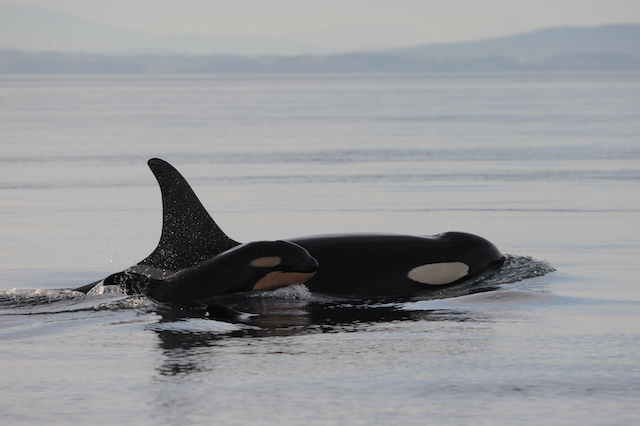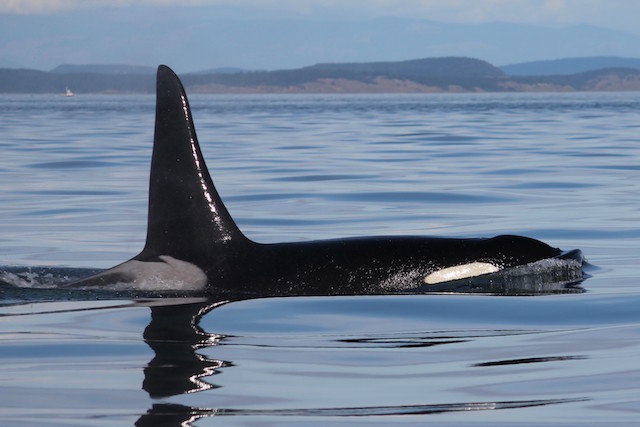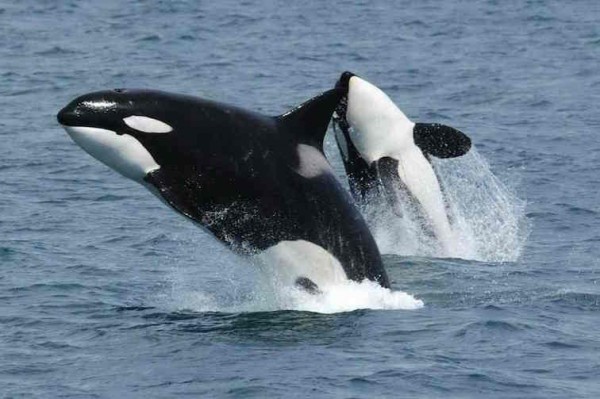
SPECIES: Southern Resident Killer Whale (Orcinus orca)
CURRENT RANGE: Pacific North East, around Puget Sound, Strait of Juan de Fuca, Southern Georgia Strait
CURRENT THREATS: Decreased prey availability, boat interactions, environmental contamination
CONSERVATION STATUS: Endangered
WHERE YOU CAN SEE THEM: Washington and British Columbia
What Are Southern Resident Killer Whales?
Killer whales (a.k.a. orca) are the largest dolphins in the world. They’re also the most dispersed of all dolphin species, being found from Arctic and Antarctic waters to more tropical climes. They were originally called killer whales, as some do actually kill whales. For years orca had a fearsome reputation, falsely believed by many to be man-hunters. Over time, it was seen that orcas are specialist feeders.
Around the west coast of Canada there are three different types of orcas. One type are called Transients (or Bigg’s killer whales), which feed almost exclusively on marine mammals. They are very quiet so as to not scare away potential prey, and tend to have loose family bonds. Offshore orcas travel in large groups and feed far offshore, where they prey upon sleeper sharks (and experience tooth wear due to the sharks’ sandpaper-like skin). Resident orcas feed primarily on fish and squid. They are very vocal and live in tight-knit family units called pods. Pods which share similar dialects belong to the same clan.
One population of resident orcas is called the Southern Resident Killer Whales (SRKW). The other, called Northern Residents, are found around Johnstone Strait and Northern British Columbia. Even though Residents and Transients travel through the same areas, they studiously avoid each other. They also have different dialects, hunting techniques, prey and family units. Some scientists believe these orcas may need to be reclassified as separate species or subspecies.
Of all the Resident clans that frequent these waters, the SRKW’s are the most endangered, with just 82 individuals remaining. They have only one clan consisting of 3 pods– named J, K and L pod– which have 28, 19 and 35 members, respectively. Each of these pods is made up of matrilines, comprised of at least one female, her sons and daughters, and the offspring of her daughters.

Why are Southern Resident Killer Whales Endangered?
The SRKW’s are the only orca population listed as endangered by the U.S Fish and Wildlife Service. They suffered heavy losses between 1965-1975, when many members of their families were captured for exhibition in marine parks.
Of all the orcas that were captured during that time, 13 were killed and 45 were sent to various marine parks around the world. Only one of these orcas, Lolita (Tokitae), remains alive today. She currently resides in the Miami Seaquarium. The oldest member of the J pod, “Granny,” is estimated to be 104 years old. She was captured in 1967 along with the rest of her pod, but was considered too old for the marine parks and was eventually released.
Other issues these orcas face include reduced prey availability, boat interactions and environmental pollution. Southern Resident Killer Whales feed mainly on salmon, and numbers are being reduced due to overfishing and diseases from farmed fish affecting wild salmon stocks.
Boat activity from both commercial and recreational vessels can detrimentally affect these orcas as well. Boats travelling at speed through the whales’ paths have occasionally struck and injured them, sometimes fatally. Noise and disturbance from boats can also alter orca behaviour, reducing their ability to communicate and locate prey.
Increased pollution from industrial and domestic contaminants entering the orcas’ environment has caused a toxic overload in their tissue and body fat. DDT (an insecticide) and PCB’s have been found in such high levels in dead orcas that their bodies have had to be disposed at hazardous waste sites. This lethal contaminant load causes reduced fertility, high mortality and genetic alterations.

What’s being done to save Southern Resident Killer Whales?
The SRKW’s were designated by the IUCN as Endangered in 2005, and critical habitat was assigned for them in 2006. Despite these protective measures, more habitat is being earmarked for future protection. The National Marine Fisheries Service (NMFS) has issued a petition to add more critical habitat, which includes Pacific ocean waters along the West Coast of the United States. This area includes crucial foraging and wintering habitat for the SRKW’s.
A recovery plan published by the National Oceanic and Atmospheric Administration (NOAA) in 2014 is advocating the following measures to protect these vulnerable whales:
1. Rebuilding depleted salmon and other fish stocks to ensure adequate food is available to aid recovery of SRKW’s.
2. Reducing chemical contamination and pollution in SRKW habitat. Treatment of wastewater in Puget Sound to remove contaminants that will affect the whales.
3. Minimising disturbance of SRKW’s from vessels. In 2011 regulations increased the allowable distance from vessels to the whales in Washington State from 100 to 200 yards.
With increased understanding of their behaviour, co-operation between the United States and Canadian authorities, and additional protective measures, it is hoped that these formidable fish eaters will soon begin making a comeback.
Written by Suzanne Burns; thanks to The Center for Whale Research for population data and photos.
Source: Green Global Travel